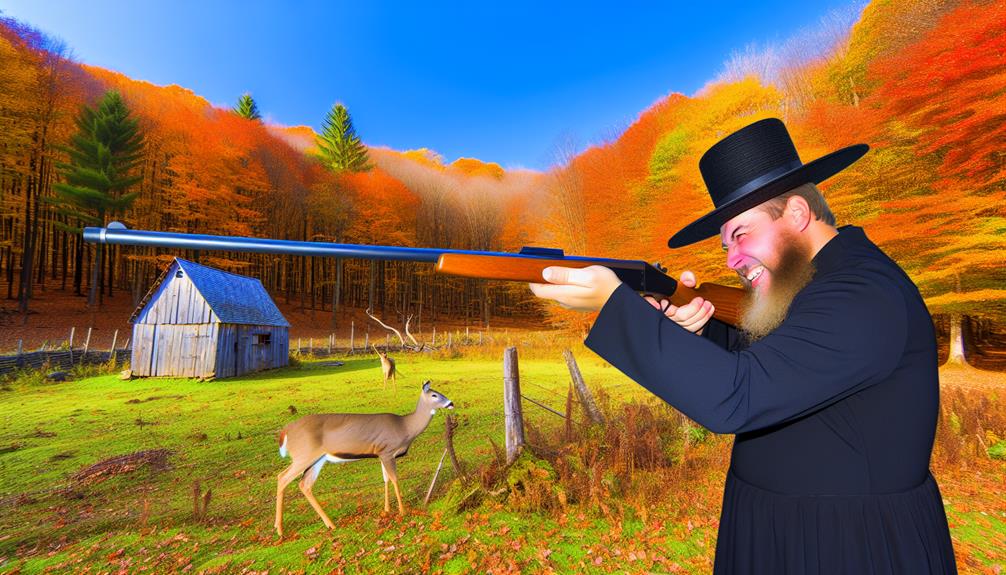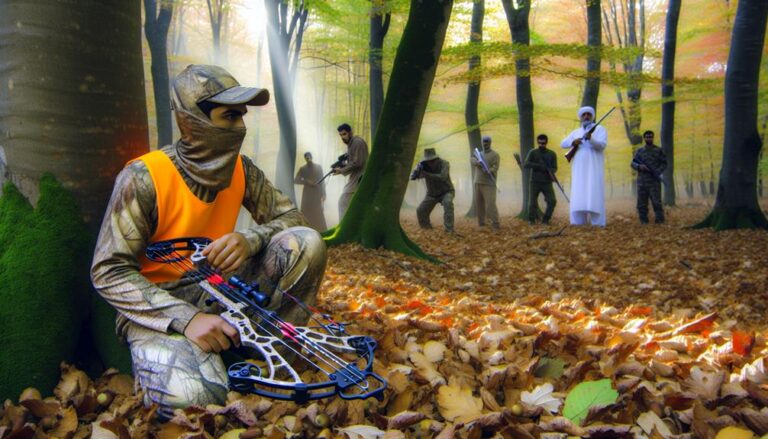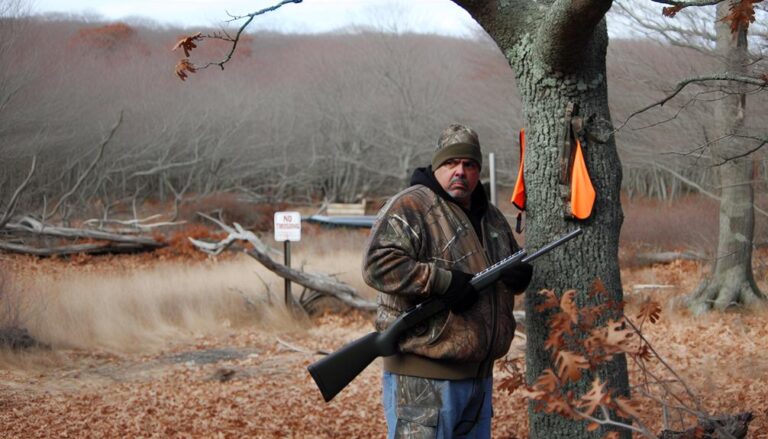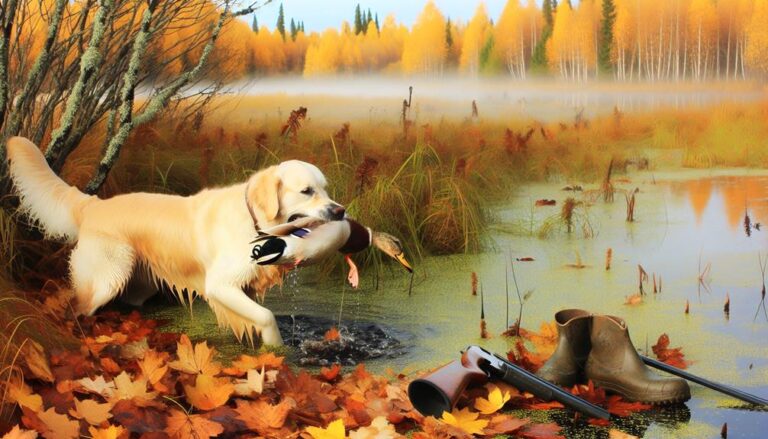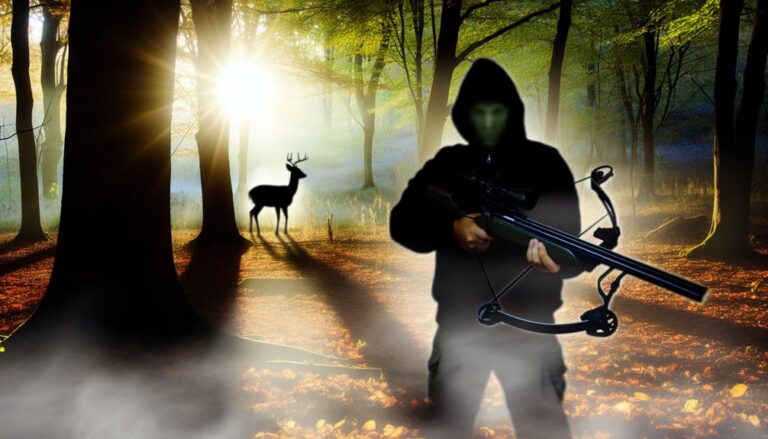Can Amish People Hunt Year Round
Amish hunting practices vary among communities, but they're generally bound by both their religious traditions and state regulations. While some Amish groups may allow year-round hunting for sustenance, they must still comply with local and state laws regarding hunting seasons, permits, and conservation efforts. The Ordnung, a set of community-specific rules, guides Amish hunters' approach to hunting and determines when and how it can take place. You'll need to take into account both the Amish community's practices and the specific state regulations where they reside. Understanding the balance between Amish traditions and modern wildlife management reveals a nuanced approach to hunting.
Amish Hunting Traditions
Exploring Amish hunting traditions reveals a complex interplay between cultural practices and modern regulations. You'll find that Amish hunting practices vary widely among different communities, reflecting their diverse interpretations of cultural values and local customs. While some Amish groups permit year-round hunting, others adhere to specific seasons or limit the types of animals that can be hunted.
At the core of Amish hunting traditions are the beliefs in hunting for sustenance and connecting with nature. These principles guide their approach to hunting and shape their practices. Each Amish community follows a set of rules called the Ordnung, which outlines acceptable hunting practices within their group. The Ordnung helps Amish individuals navigate the balance between upholding their traditions and complying with hunting regulations.
If you're interested in Amish hunting in Texas, it's important to mention that Amish hunters, like all residents, must follow state hunting laws. This requirement emphasizes the need to respect both cultural traditions and legal regulations. By understanding these aspects of Amish hunting traditions, you can appreciate the nuanced approach Amish communities take to this activity.
Seasonal Restrictions and Exceptions
When considering Amish hunting practices, you'll need to be aware of legal hunting seasons that apply to all hunters, including the Amish.
These seasons typically vary by animal species and region, so it's crucial to check local regulations for specific dates and restrictions.
In some cases, special permits or exceptions may be available for religious or cultural reasons, but these are generally evaluated on a case-by-case basis.
Legal Hunting Seasons
Legal hunting seasons apply to everyone, including the Amish, and vary by state and animal species. While some Amish communities may allow year-round hunting for sustenance, it's essential to understand that these practices must still align with local and state regulations.
As an Amish hunter, you'll need to be aware of the specific seasons for different game animals in your area. To make sure you're hunting legally, familiarize yourself with your state's hunting calendar. This will outline when you can hunt certain animals, such as deer, turkey, or small game.
Remember that these seasons are designed to protect wildlife populations and maintain ecological balance. Even if your Amish community permits year-round hunting, you must adhere to these legal restrictions.
It's also important to note that some animals may have different seasons for various hunting methods. For example, bow hunting seasons might differ from firearm seasons. Always check the current regulations before planning your hunt.
Special Permits Consideration
While general hunting seasons apply to all, some Amish communities have secured special permits that allow for year-round hunting under specific conditions. These permits are often granted based on the unique cultural and religious practices of the Amish, as outlined in their Ordnung. The Ordnung, or set of rules followed by each Amish community, may dictate hunting practices that differ from standard regulations.
When considering special permits for Amish hunters, it's important to understand the following points:
- Permits are typically granted on a community-by-community basis
- They're often tied to specific guidelines within the Amish Ordnung
- Year-round hunting may be limited to certain types of game or specific areas
- Regular reporting and adherence to conservation practices may be required
These special permits don't exempt Amish hunters from all regulations. They're still expected to hunt responsibly and within the agreed-upon guidelines.
If you're curious about Amish hunting practices in your area, it's best to contact local wildlife authorities for accurate information. They can provide details on any special permits or exceptions that may apply to Amish communities in the region.
Ordnung and Hunting Practices
Guided by their community's Ordnung, Amish hunters follow a unique set of rules that shape their approach to hunting throughout the year. The Ordnung, a set of guidelines specific to each Amish community, plays a pivotal role in determining when and how hunting can take place. You'll find that these rules vary among different Amish groups, with some allowing year-round hunting while others impose stricter limitations.
When you're considering Amish hunting practices, it's important to understand that the Ordnung isn't just a list of dos and don'ts. It's a fundamental part of Amish life that reflects their values and connection to nature. For Amish hunters, adhering to the Ordnung is essential. It safeguards that hunting remains a means of providing for their families while maintaining their cultural and religious beliefs.
The Ordnung may specify which animals can be hunted, the methods allowed, and the seasons during which hunting is permitted. These guidelines help preserve wildlife populations and maintain the Amish community's sustainable approach to living off the land. By following the Ordnung, Amish hunters demonstrate their commitment to their faith and way of life.
Wildlife Conservation Among Amish
Amish communities strike a delicate balance between their hunting traditions and wildlife conservation efforts. In Amish country, you'll find a unique approach to managing wildlife populations while maintaining their cultural practices. The Amish focus on sustainable hunting, which helps to preserve local ecosystems and maintain healthy animal populations.
Here are four key aspects of wildlife conservation among the Amish:
- Hunting for sustenance: Amish hunters prioritize harvesting game for food, not trophies.
- Following Ordnung: Many Amish groups have specific rules guiding acceptable hunting practices.
- Year-round management: Amish hunting activities help control wildlife populations throughout the year.
- Coexistence: Observations show that wildlife thrives around Amish homesteads despite hunting practices.
The Amish approach to wildlife conservation is rooted in their connection to nature and respect for the land. By focusing on hunting for food and following their community's guidelines, they help maintain a balance in local ecosystems.
This approach allows them to continue their hunting traditions while ensuring the long-term health of wildlife populations. As a result, Amish country often serves as an example of how hunting and conservation can coexist harmoniously.
Legal Implications of Year-Round Hunting
When considering year-round hunting for Amish communities, you need to be aware of several legal implications.
You'll encounter seasonal hunting restrictions that vary by state and game species, as well as licensing and permit requirements that must be met.
Additionally, you should understand wildlife conservation considerations, which play an essential role in maintaining balanced ecosystems and sustainable hunting practices.
Seasonal Hunting Restrictions
Hunters, including those in Amish communities, must navigate a complex web of seasonal restrictions and legal requirements when pursuing game throughout the year. While some Amish communities allow year-round hunting for sustenance, they're still bound by regional and species-specific regulations. These restrictions often include designated rifle seasons, which limit the use of firearms to specific time frames for certain animals.
To comply with seasonal hunting restrictions, Amish hunters should:
- Familiarize themselves with local and state hunting regulations
- Obtain necessary licenses and permits for each season
- Respect designated hunting periods for different species
- Adhere to weapon-specific seasons, such as rifle season
It's important to understand that seasonal restrictions vary by location and animal type. For example, deer hunting might be limited to a few weeks in autumn, while small game seasons could be more extended. Even if Amish community rules permit year-round hunting, members must still abide by these legal restrictions.
Balancing traditional Amish hunting practices with modern regulations can be challenging. However, compliance is necessary to maintain wildlife populations and guarantee fair hunting opportunities for all.
Licensing and Permit Requirements
Legal adherence is an essential aspect of year-round hunting for Amish individuals, requiring specific licenses and permits. If you're Amish and want to hunt throughout the year, you've got to go through the proper channels to obtain the necessary documentation.
State wildlife agencies set specific requirements for licensing and permits, which you must follow to engage in year-round hunting activities legally.
It's important to understand that these regulations apply to all hunters, including Amish communities. Failure to comply with licensing and permit requirements can result in serious legal consequences. You'll need to research and obtain the appropriate licenses for the types of game you plan to hunt and the seasons in which you'll be hunting.
These licensing and permit requirements serve significant purposes beyond legal adherence. They help guarantee sustainable hunting practices and allow wildlife agencies to monitor and manage animal populations effectively.
Wildlife Conservation Considerations
Numerous wildlife conservation factors come into play when examining the legal implications of year-round hunting for Amish communities. When evaluating whether Amish people can hunt year round, it's vital to grasp the potential impact on local wildlife populations and ecosystems. Wildlife authorities closely monitor hunting activities to maintain a balance between cultural practices and conservation efforts.
Here are four key factors to consider concerning year-round hunting and wildlife conservation:
- Population management: Continuous hunting may influence animal breeding cycles and population growth rates.
- Habitat preservation: Year-round hunting could result in increased human activity in delicate wildlife areas.
- Species-specific regulations: Some animals may need more stringent protection during specific seasons.
- Ecosystem balance: Overhunting of one species can have ramifications throughout the food chain.
State and local regulations often limit hunting to specific seasons to safeguard wildlife populations. These laws apply to all hunters, including Amish individuals, irrespective of their community's customs.
It's essential for Amish hunters to be mindful of and adhere to these regulations to guarantee sustainable wildlife management. Through collaboration, wildlife authorities and Amish communities can find a balance that respects both cultural practices and conservation requirements.
Subsistence Vs. Recreational Hunting
In contrast to recreational hunting, the Amish approach to year-round hunting stems from a deep-rooted need for subsistence and self-sufficiency. The Amish primarily hunt to provide food for their families and communities, rather than for sport or entertainment. This practice aligns with their traditional values of simplicity and resourcefulness.
When you compare subsistence hunting to recreational hunting, you'll notice some key differences. The first two major distinctions are the purpose and frequency. Amish hunters focus on obtaining sustainable meat sources throughout the year, while recreational hunters often pursue game during specific seasons for enjoyment or trophies.
Additionally, Amish hunting practices emphasize ethical and responsible harvesting of wildlife to guarantee a consistent food supply.
Cultural Perspectives on Amish Hunting
Amish hunting practices reflect deeply-held cultural values that prioritize self-sufficiency, community support, and stewardship of natural resources. These practices are often guided by the Ordnung, a set of community rules that shape daily life and traditions.
When it comes to hunting, you'll find that Amish communities approach it with a unique perspective that sets them apart from mainstream society. Here are four key aspects of Amish hunting culture:
- Subsistence focus: Hunting is primarily for food, not sport
- Year-round practice: Some communities allow hunting throughout the year
- Community-oriented: Hunters often share their bounty with others
- Nature connection: Hunting reinforces the Amish bond with the land
You might be surprised to learn that the guy got his hunting skills from a young age, as many Amish children are taught to hunt and process game. This cultural emphasis on hunting as a practical skill rather than a recreational activity shapes how Amish communities view and practice hunting.
While they strive to maintain their traditions, Amish hunters also face the challenge of balancing their practices with modern legal regulations.
Balancing Tradition With Regulations
Balancing longstanding Amish hunting traditions with modern wildlife regulations presents a unique challenge for many communities. As an Amish hunter, you'll need to understand both your community's Ordnung and the local hunting laws. This balance is essential for maintaining harmony within your community and respecting wildlife conservation efforts.
Your Ordnung may allow for year-round hunting, but state and federal regulations often impose specific seasons and limits. For example, turkey hunting is typically restricted to certain months of the year. You'll need to adapt your practices to comply with these rules, even if they differ from traditional Amish approaches.
To navigate this challenge, consider working with local wildlife officials to understand regulations and explore potential accommodations for Amish hunting practices. You might also discuss with your community leaders how to integrate modern conservation principles into your hunting traditions. This could involve adjusting hunting schedules or methods to align with wildlife management goals.
